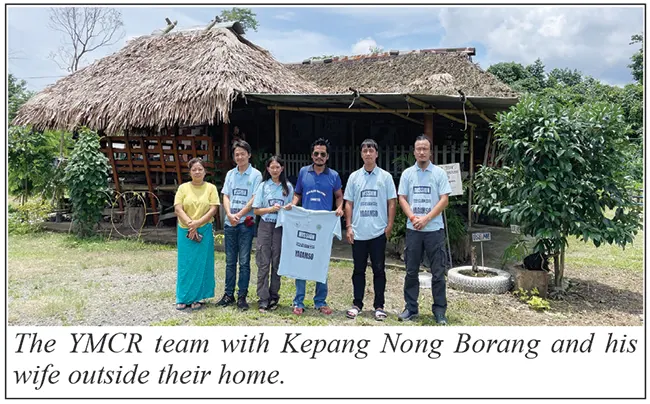[ Prem Taba ]
Our mission to clean the Pane Korong River in Pasighat had been a success. With the help of the local community, we at the Youth Mission for Clean River (YMCR) managed to remove a staggering 25,000 kilograms of waste from the waterway. Feeling energized by this collective effort, we decided to extend our clean-up mission and visit a village renowned for its dedication to cleanliness – Silluk, the crown jewel of East Siang district.
The journey to Silluk itself was a visual treat. Lush green landscapes and winding roads unfolded before us, building anticipation for the tranquility that awaited. As we approached the village, a gasp escaped our lips. The surroundings were impeccably clean, unlike anything we had ever witnessed. It became clear that cleanliness was not just a habit in Silluk; it was a way of life.
We were fortunate to meet Kepang Nong Borang, a former All Arunachal Pradesh Students’ Union (AAPSU) activist who spearheaded Silluk’s clean-up revolution back in 2018. His passion was infectious. He spoke about the village’s earlier struggles with litter, cow dung, and wandering cattle. He chuckled as he recalled how friends used to tease him about the village’s state.
Borang’s determination was inspiring. He described the three-month long effort it took to create a fenced zone for the cattle, emphasizing the sheer hard work involved. Initially, cattle owners were fined for not complying, a measure that eventually led to a change in behavior.
Silluk’s clean-up strategy is a marvel of community participation. The village is divided into six colonies, each with designated tasks.
Every morning, except during peak farming season, a megaphone announcement rallies the residents. Each household contributes at least one family member to the daily cleaning routine. Additionally, a mega clean-drive takes place every second day of the month.
The dedication goes beyond just sweeping. Residents plant and care for trees and flowers, remove plastic waste, clean stagnant water, and maintain toilets. Even the surroundings are painted, and older folks contribute by weaving traditional baskets to be used as dustbins. It is a true testament to collective action.
Silluk’s efforts have not gone unnoticed. The village has received numerous prestigious awards including the prestigious Naturenomics Award by the Balipara Foundation, also catching the attention of personalities like Jadav Payeng, the ‘Forest Man of India.’
Borang himself emphasized, “Don’t just do cleanups. Spread awareness. Involve the community, then only can the behavioral change be achieved in keeping our surroundings clean.”
His dedication extends beyond the clean-up drives. After his morning cleaning routine, he often heads to the market area, sweeping and picking up trash from other people’s shops. In a way, this act serves as a gentle nudge, inspiring others to join the clean movement.
However, Borang admits to occasional moments of doubt. He worries about his children’s education and providing for his family. He contemplates pursuing income-generating ventures. But then, motivated by visitors who come to learn about Silluk’s clean-up campaign, he finds renewed purpose.
Silluk’s clean-up initiative, aptly named Swachh Silluk Abhiyan, is led by Borang himself, with the overall execution and monitoring overseen by the Silluk Village Development Committee, which he chairs. During clean-ups, the Silluk Dolung Yameng Kebang observes the process and reports on participation. Fines are levied on those who neglect their cleaning duties, collected by a committee of village elders.
The commitment to a clean environment extends beyond village beautification. Hunting and fishing are banned, and the villagers have even rescued and released exotic wild animals back into their natural habitats within the Itanagar Biological Park and Pakke Tiger Reserve.
Walking through Silluk’s streets, we could not help but admire the bamboo dustbins placed strategically every 100 meters. Unlike some communities that rely on municipalities for waste management, Silluk residents take immense pride in their village’s cleanliness. It is a testament to their strong sense of community ownership, where picking up garbage, whether generated by locals or tourists, is seen as a shared responsibility.
Visiting Silluk felt like stepping into a pristine oasis. Here, cleanliness was not just a chore; it was a deeply ingrained value. The journey to this idyllic village not only educated us about their waste management techniques but also served as a powerful reminder that true environmental change hinges on community participation and unwavering dedication. Inspired by Silluk’s success story, the YMCR team returned to Itanagar with renewed zeal, determined to replicate this model of collective action in other communities. (The writer is a research scholar, department of mass communication)


